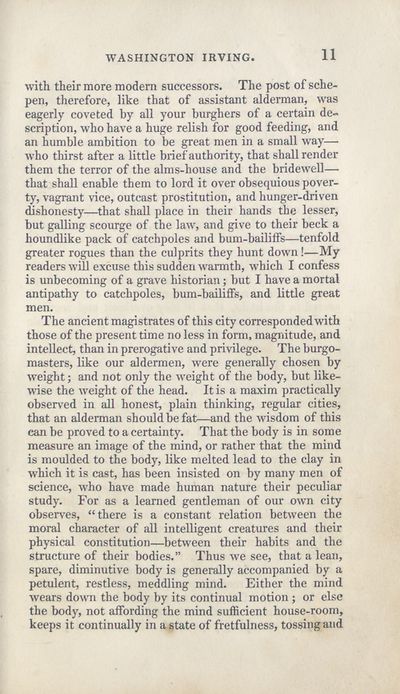Download files
Complete book:
Individual page:
Thumbnail gallery: Grid view | List view

WASHINGTON IRVING.
11
with their more modem successors. The post of sche-
pen, therefore, like that of assistant alderman, was
eagerly coveted by all your burghers of a certain de¬
scription, who have a huge relish for good feeding, and
an humble ambition to be great men in a small way—
who thirst after a little brief authority, that shall render
them the terror of the alms-house and the bridewell—
that shall enable them to lord it over obsequious pover¬
ty, vagrant vice, outcast prostitution, and hunger-driven
dishonesty—that shall place in their hands the lesser,
but galling scourge of the law, and give to their beck a
houndlike pack of catchpoles and bum-bailiffs—tenfold
greater rogues than the culprits they hunt down!—My
readers will excuse this sudden warmth, which I confess
is unbecoming of a grave historian; but I have a mortal
antipathy to catchpoles, bum-bailiffs, and little great
The ancient magistrates of this city corresponded with
those of the present time no less in form, magnitude, and
intellect, than in prerogative and privilege. The burgo¬
masters, like our aldermen, were generally chosen by
weight; and not only the weight of the body, but like¬
wise the weight of the head. It is a maxim practically
observed in all honest, plain thinking, regular cities,
that an alderman should be fat—and the wisdom of this
can be proved to a certainty. That the body is in some
measure an image of the mind, or rather that the mind
is moulded to the body, like melted lead to the clay in
which it is cast, has been insisted on by many men of
science, who have made human nature their peculiar
study. For as a learned gentleman of our own city
observes, “there is a constant relation between the
moral character of all intelligent creatures and their
physical constitution—^between their habits and the
structure of their bodies.” Thus we see, that a lean,
spare, diminutive body is generally accompanied by a
petulent, restless, meddling mind. Either the mind
wears down the body by its continual motion ; or else
the body, not affording the mind sufficient house-room,
keeps it continually in a state of fretfulness, tossing and
11
with their more modem successors. The post of sche-
pen, therefore, like that of assistant alderman, was
eagerly coveted by all your burghers of a certain de¬
scription, who have a huge relish for good feeding, and
an humble ambition to be great men in a small way—
who thirst after a little brief authority, that shall render
them the terror of the alms-house and the bridewell—
that shall enable them to lord it over obsequious pover¬
ty, vagrant vice, outcast prostitution, and hunger-driven
dishonesty—that shall place in their hands the lesser,
but galling scourge of the law, and give to their beck a
houndlike pack of catchpoles and bum-bailiffs—tenfold
greater rogues than the culprits they hunt down!—My
readers will excuse this sudden warmth, which I confess
is unbecoming of a grave historian; but I have a mortal
antipathy to catchpoles, bum-bailiffs, and little great
The ancient magistrates of this city corresponded with
those of the present time no less in form, magnitude, and
intellect, than in prerogative and privilege. The burgo¬
masters, like our aldermen, were generally chosen by
weight; and not only the weight of the body, but like¬
wise the weight of the head. It is a maxim practically
observed in all honest, plain thinking, regular cities,
that an alderman should be fat—and the wisdom of this
can be proved to a certainty. That the body is in some
measure an image of the mind, or rather that the mind
is moulded to the body, like melted lead to the clay in
which it is cast, has been insisted on by many men of
science, who have made human nature their peculiar
study. For as a learned gentleman of our own city
observes, “there is a constant relation between the
moral character of all intelligent creatures and their
physical constitution—^between their habits and the
structure of their bodies.” Thus we see, that a lean,
spare, diminutive body is generally accompanied by a
petulent, restless, meddling mind. Either the mind
wears down the body by its continual motion ; or else
the body, not affording the mind sufficient house-room,
keeps it continually in a state of fretfulness, tossing and
Set display mode to:
![]() Universal Viewer |
Universal Viewer | ![]() Mirador |
Large image | Transcription
Mirador |
Large image | Transcription
| Antiquarian books of Scotland > Languages & literature > Beauties of Washington Irving > (35) |
|---|
| Permanent URL | https://digital.nls.uk/114705802 |
|---|
| Description | Thousands of printed books from the Antiquarian Books of Scotland collection which dates from 1641 to the 1980s. The collection consists of 14,800 books which were published in Scotland or have a Scottish connection, e.g. through the author, printer or owner. Subjects covered include sport, education, diseases, adventure, occupations, Jacobites, politics and religion. Among the 29 languages represented are English, Gaelic, Italian, French, Russian and Swedish. |
|---|

